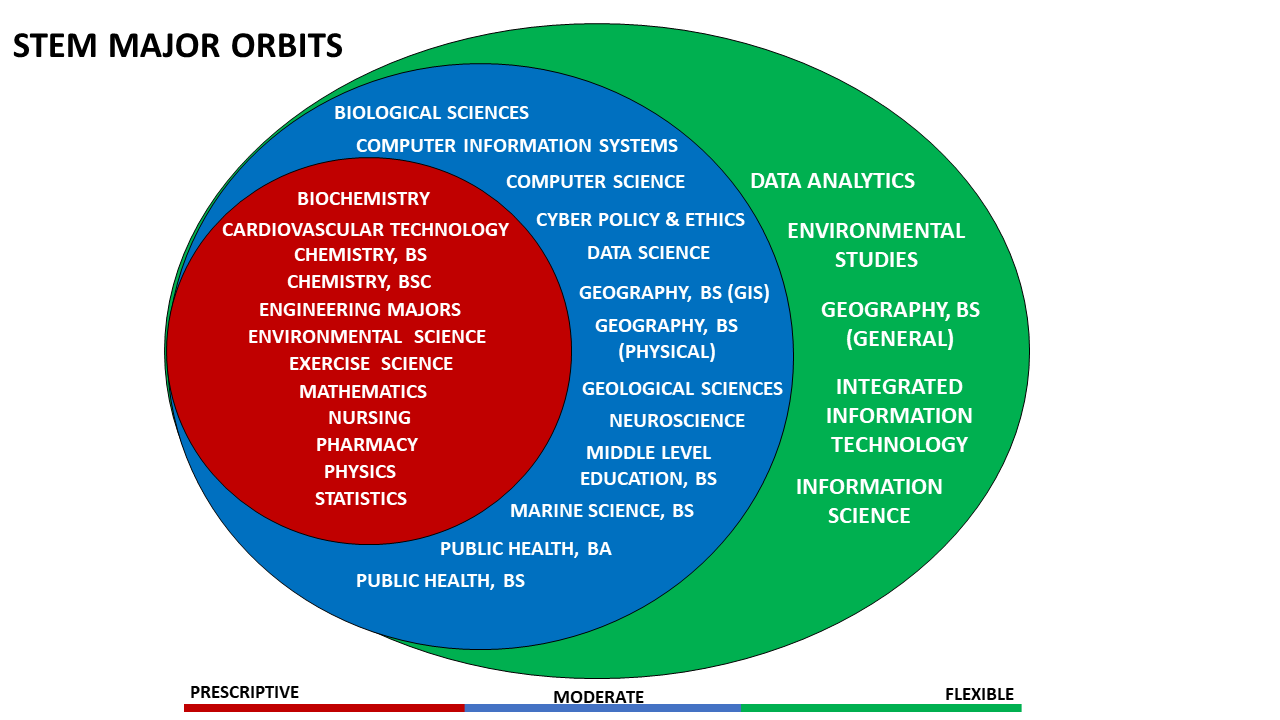Degree programs in the STEM (science/technology/engineering/mathematics) Area of Interest prepare students for careers in the health sciences, scientific research, education, environmental sciences, science and technology policy, government, cybersecurity, and business. Through STEM curriculums that include coursework in the classroom, laboratory, and field students gain knowledge and skills that will enable them to succeed in a variety of career fields. To learn which majors in this Area of Interest have a more prescriptive, more flexible, or moderate curriculum structure check out the STEM Major Orbit below.
Major programs in italics fall into more than one Area of Interest.
The Aerospace Engineering major trains students as multidisciplinary engineers prepared for careers in the aeronautics, spaceflight, and automotive industries as well as technical consultancy.
The Biochemistry and Molecular Biology curriculum focuses on the border between the physical and life sciences.
The Biological Sciences major provides a robust curriculum on the study of life and living organisms.
The Biomedical Engineering major’s curriculum is a nexus of applied mathematics, engineering, and biology coursework and offers a choice between medical, biomechanics, or biomolecular tracks.
The Cardiovascular Technology major is an interdisciplinary program that prepares to work directly with heart patients and assist physicians in the treatment of heart patients through three years of coursework and one year of comprehensive clinical training at an accredited hospital program.
The Chemical Engineering major curriculum is grounded in mathematics, chemistry, physics, and engineering coursework and trains students in creating processes and products that are safe, environmentally friendly, energy efficient, and economical.
The Chemistry—Bachelor of Science (B.S.) major provides a robust curriculum on the study of matter, its properties, and reactivities, and also includes coursework in physics and mathematics.
The Chemistry—Bachelor of Science in Chemistry (B.S.C.) includes coursework on chemistry and academic research methods and techniques. Students graduating form this program will also earn an American Chemical Society (ACS) certification.
The Civil Engineering major’s curriculum trains students to plan, design, and construct projects that structure our societies through coursework in mathematics, engineering, and the physical sciences.
The Computer Information Systems major includes curriculum on programming, software development, and practical business mathematics, and requires a Business Information Management minor.
The Computer Science major prepares students to develop large, complex software and understand computation, and offers students a choice between clusters of expertise in game design, data science, and bioinformatics.
The Cyber Policy and Ethics major curriculum is interdisciplinary and features coursework from computer science, geography, political science, mathematics and statistics, philosophy, psychology, and critical foreign languages.
The Electrical Engineering curriculum combines mathematics, physics, computing, and engineering coursework to prepare students for careers in the multitude of fields that rely on the technology of electricity.
The Environmental Science major is part of the environment and sustainability program in the School of Earth, Ocean, and the Environment. Its curriculum provides a strong scientific foundation and a choice of area of emphasis in natural systems, water resources, weather and climate, energy, or human environment interaction.
The Environmental Studies major is part of the environment and sustainability program in the School of Earth, Ocean, and the Environment. Its curriculum provides interdisciplinary coursework in sustainability, policy, advocacy, environmental ethics, ecology, and economics.
The Exercise Science major is a science-based curriculum focusing on the relationship between physical activity and human health.
The Geography—B.S. curriculum integrates quantitative and scientific-based coursework on the study of natural and human environments and offers tracks in general geography, GIScience, and physical/environmental geography.
The Geological Sciences major provides a robust curriculum on the dynamics and physical history of the Earth as well as its physical, chemical, and biological changes.
The Information Science major's curriculum includes coursework on the generation, organization, storage, transmission, use, and dissemination of data and data sets in the professional world.
The Integrated Information Technology major prepares students to design, implement, improve, manage, and offer end-user support and training on information systems, database systems, information networks, websites, and large-scale computing projects.
The Marine Science major's curriculum takes a holistic approach to the study of the oceans, and students may choose an area of emphasis in biological, chemical, geological, or physical oceanography or coastal resource management/marine affairs.
The Mathematics major provides a robust curriculum in number theory, calculus, mathematical structure (algebra), geometry, and statistics, and choose an area of emphasis in actuarial, applied, or general mathematics or mathematics education.
The Mechanical Engineering curriculum combines design, development, and manufacture of both mechanical and thermal systems.
The Middle Level Education BS major requires the general core curriculum and a specialization in two content areas – at least one being math or science.
The Neuroscience major brings together the multiple scientific disciplines across campus that focus on the nervous system and requires a concentration in Cellular in Molecular Neuroscience, Cognitive and Behavioral Neuroscience, or Neurodevelopment and Neurodevelopmental Disorders.
The Nursing major is a science-based program that combines pre-nursing courses along with clinical hours and a simulation lab. This program is split up into lower and upper divisions, with admission to upper division requiring an application process.
Consider Alternate Pathways to Nursing
If you are a current nursing student, and/or are considering a major in a related healthcare field, watch these videos to learn more about alternative major pathways that can lead to similar career opportunities in health care.
The Pharmaceutical Science degree combines core and laboratory-based coursework, instills the knowledge and skills of a well-rounded and well-educated scientist.
The Physics major provides a fundamental understanding of both experimental and theoretical physics.
The Bachelor of Science in Public Health entails a broad-based natural science curriculum, preparing students for further study in the public health sciences, medicine, and other clinical professions.
The Statistics major provides students a robust curriculum centered around statistics and data science. The major allows students to choose two tracks: a general statistic major and statistics with an emphasis in actuarial mathematics and statistics.
